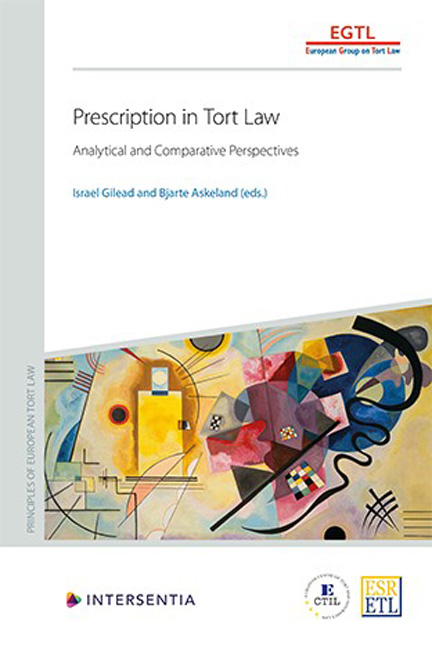Book contents
- Frontmatter
- Dedication
- Acknowledgements
- Contents
- List of Authors
- PART I THEORETICAL AND COMPARATIVE ANALYSES
- Analytical and Comparative Report
- Economic Analysis
- PART II PRESCRIPTION IN TORT LAW OUTLINED
- Case Scenarios
- Austria
- Belgium
- Czech Republic
- England and Wales
- France
- Germany
- Greece
- Italy
- The Netherlands
- Norway
- Poland
- South Africa
- Spain
- Switzerland
- United States
- European Union
- Appendix: Questionnaire
- About the Editors
Austria
Published online by Cambridge University Press: 22 December 2020
- Frontmatter
- Dedication
- Acknowledgements
- Contents
- List of Authors
- PART I THEORETICAL AND COMPARATIVE ANALYSES
- Analytical and Comparative Report
- Economic Analysis
- PART II PRESCRIPTION IN TORT LAW OUTLINED
- Case Scenarios
- Austria
- Belgium
- Czech Republic
- England and Wales
- France
- Germany
- Greece
- Italy
- The Netherlands
- Norway
- Poland
- South Africa
- Spain
- Switzerland
- United States
- European Union
- Appendix: Questionnaire
- About the Editors
Summary
INTRODUCTION
The Austrian general rules on prescription can be found in the fourth chapter (‘Hauptstück‘) of the third part of the Austrian Civil Code (Allgemeines Bürgerliches Gesetzbuch, ABGB), therefore in the code's last substantive segment. It is entitled‘Von der Verjährung und Ersitzung‘(‘Of extinctive and acquisitive prescription‘) and therefore combines the possible effect of the passage of time on rights and claims combined. § § 1451 ff ABGB therefore not only address the loss of a claim (as will be the prime focus in the following), but also the accrual of a right by another after fulfilling certain criteria over a specific period of time.
§ 1451 ABGB defines prescription as‘the loss of a right which has not been exercised over a period defined by law ‘. If this loss coincides with the passage of the right to another due to the latter's qualified possession, the ABGB speaks of acquisitive prescription, thereby making it a mere sub-category of the former (§ 1452 ABGB). This sub-category is addressed in § § 1453– 1477, whereas § § 1478 ff ABGB focus on cases where someone‘just‘loses a right, but no-one else acquires it instead (extinctive prescription, or– as § 1478 ABGB calls it–‘eigentliche Verjährung ‘, which literally translates as‘actual prescription‘). Still, this second part of the rules on (extinctive) prescription include references to the former, and both types of prescription are addressed in the third part of the ABGB rules thereupon (§ § 1493 ff ABGB), which inter alia deal with general aspects such as postponement and the effect of prescription.
The ABGB addresses the prescription of tort claims specifically in § § 1489 f ABGB. Other statutes with tort law content either refer back to these provisions or include specific rules on prescription, which either essentially mirror the ABGB provisions (eg § 20 AtomHG, § 17 para 1 EKHG, § 55 ForstG, § 8 RHPflG) or include at least partial deviations therefrom (eg § 6 AHG, § 37h KartellG, § 5 OrgHG, § 13 PHG, § 5 PolBEG).
- Type
- Chapter
- Information
- Prescription in Tort LawAnalytical and Comparative Perspectives, pp. 139 - 172Publisher: IntersentiaPrint publication year: 2020

